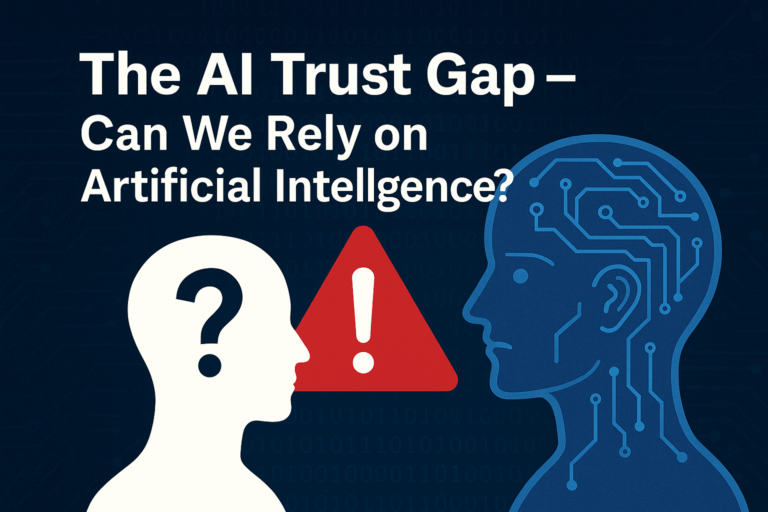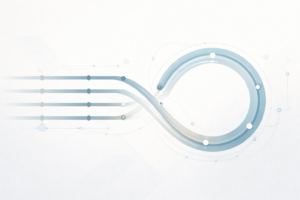Artificial intelligence (AI) is transforming industries—from automating customer service to diagnosing diseases. But with every leap forward, a deeper question emerges:
Can we truly trust AI?
The answer isn’t as binary as the algorithms behind the technology. Trust in AI isn’t just a technical issue; it’s a human one—shaped by ethics, governance, transparency, and real-world consequences.
What Is the AI Trust Gap?
The AI trust gap refers to the growing disconnect between what AI can do and how confident people are in relying on it. Several factors contribute to this divide:
- Lack of transparency: Many AI models operate as “black boxes” with decisions that are difficult—or impossible—to explain.
- Algorithmic bias: From hiring to policing, AI has amplified discrimination in real-world scenarios, undermining fairness and trust.
- Security concerns: The rise of deepfakes, data misuse, and AI-driven cyberattacks heightens public skepticism.
- Accountability void: When AI makes a mistake, who takes responsibility—the developer, the company, or the machine?
Trust is essential not only for user confidence, but also for adoption, regulatory compliance, and long-term innovation.
Real-World Impact of the Trust Gap in Key Sectors
🏥 Healthcare: Life-Saving Potential vs. Trust Deficit
Imagine an AI tool capable of detecting cancer earlier than any doctor. Incredible, right? But what happens when doctors don’t understand how it works—or patients aren’t convinced the tool is reliable?
Example: In 2023, a promising AI diagnostic system was paused in clinical trials because medical professionals lacked confidence in its opaque decision-making. Without trust, life-saving innovation can stall.
💰 Finance: Automation Without Transparency Fuels Skepticism
AI powers fraud detection, credit scoring, and robo-advisors. But when these tools make financial decisions that feel arbitrary or biased, trust evaporates.
Example: Several major banks have faced lawsuits over biased lending algorithms that denied loans to minority groups, triggering regulatory investigations and public backlash.
Positive Example: Companies like Mastercard now deploy “glass box” AI systems that deliver explainable decisions in real time—helping rebuild consumer confidence in automated credit checks.
Without transparency and fairness, financial AI risks reputational damage and legal exposure.
🏛️ Government: When Public Services Cross Ethical Lines
Governments are increasingly using AI for surveillance, fraud detection, and resource allocation. But when the public doesn’t understand—or trust—these systems, the result is social pushback.
Example: In the Netherlands, an AI tool used to detect welfare fraud falsely flagged thousands of innocent people, leading to a national scandal and human rights investigation.
Without trust, even well-intentioned AI can erode civic confidence and spark ethical crises.
What Builds—or Breaks—AI Trust?
To close the trust gap, AI systems must be designed and governed with care. Here’s how:
- Transparency: Make AI explainable. Users need to understand how and why decisions are made.
- Fairness: Audit systems regularly and ensure diverse, representative training data.
- Security: Protect both the integrity of the system and the privacy of users.
- Governance: Assign clear accountability across the lifecycle of the AI—from design to deployment.
Organizations that prioritize Responsible AI—balancing innovation with ethical design—are the most likely to earn long-term trust.
Have You Ever Struggled to Trust AI?
Maybe it was a product recommendation that felt off, a facial recognition system that didn’t recognize you, or a chatbot that gave confusing or wrong advice.
We’d love to hear your story. Your experience might help others reflect on their relationship with AI—and push for more ethical, transparent systems.
Feel free to share in the comments below.
Why This Matters Now More Than Ever
As AI becomes embedded in everything from phones to healthcare to government policy, trust isn’t optional—it’s foundational.
Some tech leaders argue that an excessive focus on regulation and ethics might slow AI innovation and cede competitive ground to less-regulated regions. But this tension between speed and responsibility underscores a deeper truth: Responsible development isn’t a roadblock—it’s a necessity.
A 2025 Pew Research study found that 62% of U.S. adults are concerned about AI bias, reinforcing the urgency of this issue.
The AI trust gap doesn’t just hinder progress—it affects lives, livelihoods, and civil liberties. Bridging this gap is the first step toward a more responsible, AI-literate society.
✅ Ready to Dive Deeper?
Want to learn more about building trustworthy AI?
- Explore Responsible AI principles
- Advocate for policies like the AI Safety and Accountability Act of 2025



